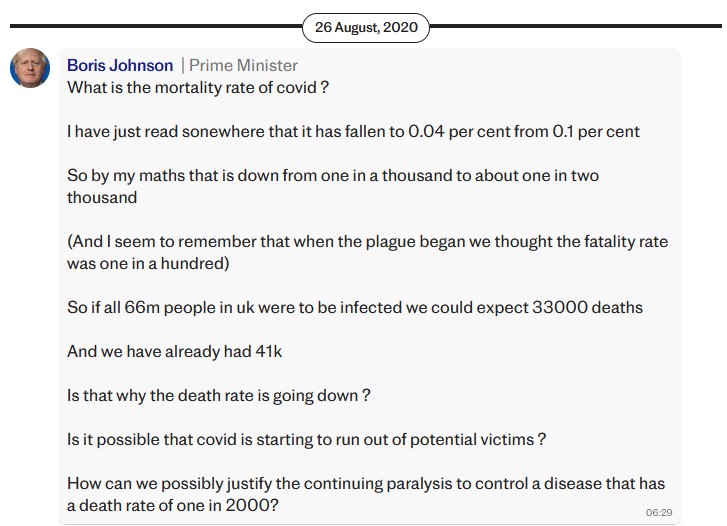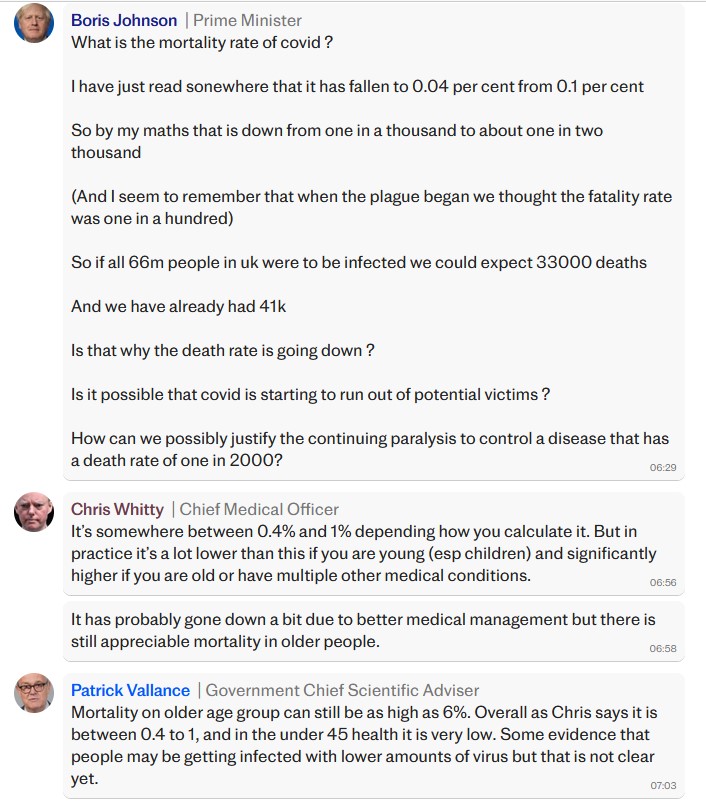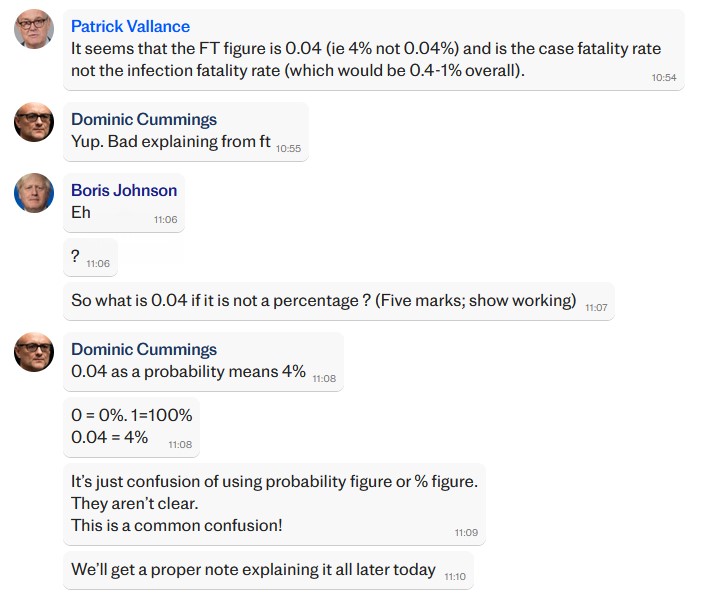Buried in WhatsApp conversations between then-prime minister Boris Johnson, his scientific advisers and Dominic Cummings, is an exchange which is arguably even more worrying than this headline-grabbing stories.
Johnson's fundamental maths mistake...
🧵1/22
Johnson's fundamental maths mistake...
🧵1/22
On 26 August 2020, Johnson asked the group:
“What is the mortality rate of Covid? I have just read somewhere that it has fallen to 0.04 per cent from 0.1 per cent.”
2/22
“What is the mortality rate of Covid? I have just read somewhere that it has fallen to 0.04 per cent from 0.1 per cent.”
2/22

He goes on to calculate that with this “mortality rate” if everyone in the UK were to be infected this would lead to only 33K deaths
He suggests that since the UK had already suffered 41K deaths at that point, this might mean “Covid is starting to run out of potential victims”
He suggests that since the UK had already suffered 41K deaths at that point, this might mean “Covid is starting to run out of potential victims”

In fact, death rates were still coming down due to the earlier fall in the number of cases brought about by lockdown.
By the time this conversation took place cases were rising again in the early stages of what would become a catastrophic second wave
4/22
coronavirus.data.gov.uk/details/cases
By the time this conversation took place cases were rising again in the early stages of what would become a catastrophic second wave
4/22
coronavirus.data.gov.uk/details/cases
Based on his faulty maths, Johnson questioned “How can we possibly justify the continuing paralysis to control a disease that has a death rate of one in 2,000?”.
5/22
5/22

He was suggesting that anti-Covid mitigations could be relaxed at perhaps the worst possible time. His whole argument was based on two fundamental misunderstandings.
6/22
6/22
His first mistake was a mathematical one. Johnson had seen the figure 0.04 in the FT and interpreted it as a percentage
In fact it was a fraction – the number of people who were dying of Covid divided by the number of people testing positive. This is the case fatality ratio (CFR)
In fact it was a fraction – the number of people who were dying of Covid divided by the number of people testing positive. This is the case fatality ratio (CFR)
At 0.04 (or 4 in 100), the CFR calculated by the Financial Times was 100 times larger than Johnson had suggested – it was actually four per cent, not 0.04 per cent as he believed.
8/22
8/22
Patrick Vallance patiently explained this to Johnson: “It seems that the FT figure is 0.04 (ie four per cent, not 0.04 per cent)”. Johnson replied “Eh? So what is 0.04 if it is not a percentage?”
9/22
9/22

At this point Dominic Cummings had to jump in and break it down into even simpler terms. Even then the messages show no acknowledgement from Johnson that he had understood.
10/22
10/22

The other mistake that Johnson made in his calculation was to confuse the case fatality ratio with the infection fatality ratio (IFR). The IFR is the number of people who die from Covid-19 as a proportion of those who get infected.
11/22
11/22
Though they may sound similar, there is a big difference between the CFR and the IFR. In the CFR we divide the number of Covid deaths by the *number of people who test positive*. However, in the IFR we divide by *the number of infected people*...
12/22
12/22
Early on in the pandemic, when testing was not readily available, the number of people who tested positive was much lower than the number of people who were actually infected with the disease. Because of this, the CFR overestimated the IFR.
13/22
13/22
By mixing up percentages and proportions, Johnson’s calculation actually underestimated what the figure should have been by a factor of 100. If he had had the CFR correct he would have come to a very different conclusion – that over 3 million people in the UK would die.
14/22
14/22
n reality, to do this calculation you need the IFR, not the CFR. With a 1 per cent IFR (closer to the true figure), the correct version of Johnson’s simplistic calculation would suggest that 660,000 people might have died in the UK if everyone became infected.
15/22
15/22
It is almost unimaginable that the leader of the United Kingdom could allow his thinking to be informed by calculations which contained such rudimentary errors.
16/22
16/22
Mistaking the CFR and the IFR would perhaps have been understandable in the early stages of the pandemic, but this conversation took place long after the first wave had subsided.
17/22
17/22
To have made this mistake over six months into the UK’s pandemic response is indicative of a leader who has failed to fully engage with even the most basic science required to make important decisions surrounding the pandemic.
18/22
18/22
It perhaps explains Johnson’s reluctance to institute stronger mitigations in the autumn of 2020 as were called for by his own scientific advisors.
19/22theguardian.com/world/2020/oct…
19/22theguardian.com/world/2020/oct…
Even less forgivable is his mathematical mistake, which is indicative of his failure to engage in scientific thinking more generally.
20/22
20/22
At a time when other leaders were going on national TV and defining important epidemiological concepts the masses, we endured a prime minister who was making basic mathematical errors the likes of which most 11-year-olds would not succumb to.
21/22theguardian.com/world/2020/apr…
21/22theguardian.com/world/2020/apr…
When it came to scientific literacy – such a crucial currency in the response to the pandemic – this incident suggests we suffered under the worst possible leader at the worst possible time.
\ENDS
\ENDS
Adapted from my @indy_voices article:
independent.co.uk/voices/boris-j…
independent.co.uk/voices/boris-j…
If you found this interesting/relevant you might enjoy some of the other life-threatening/changing blunders caused by seemingly innocuous mathematical mistakes that I've written about here: amazon.co.uk/Maths-Life-Dea…
Since this thread seems to be picking up again here's a more up-to-date reflection on the covid inquiry from my substack:
kityates.substack.com/p/covid-inquir…
kityates.substack.com/p/covid-inquir…
• • •
Missing some Tweet in this thread? You can try to
force a refresh




